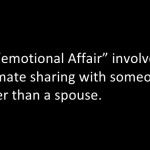Do you have a ‘work wife/husband?’ Do you find yourself chipping in extra time and effort to impress them? Do you text excessively with them when they aren’t around? Do you exchange those thinly disguised flirtatious emails? Do you find yourself sharing ‘harmless’ working lunches? Do you joke, shoot furtive glances, share secret smiles, and feel like they ‘totally get’ you? And do you keep all of this from your spouse/partner?
Well, sure you may think it’s just ‘getting along’ with a ‘friend from work.’ And that there’s no reason you should get your spouse riled up about someone you are ‘just friends’ with. But let me tell you, I can always tell trouble when I see it.
Image source: Google, copyright-free image under Creative Commons License
If you share a ‘too close’ bond with a co-worker, an ex who has suddenly become interesting, a Facebook friend, or even the college grad who lives next door, justify it in your head and to others as being ‘just friends,’ and concoct ‘white lies’ to cover up your trail and hide the details of your equation from your partner, you might be swimming in treacherous waters!
Surprised? Well, affairs do not always have to be about sneaky sexual liaisons. Emotional infidelity is a REAL thing. And what might seem as a start of a beautiful and ‘innocent’ friendship could actually spiral really quickly into the end of your ‘committed relationship.’
Suggested read: 14 facts about infidelity that will totally surprise you
Emotional infidelity definition
When one partner seeks an intimate, loving connection outside of their primary relationship, so as to fulfill the emotional needs that aren’t being met in the ‘committed bond.’
When does emotional infidelity occur?
Image source: Google, copyright-free image under Creative Commons License
This type of infidelity occurs when there is little emotional attachment between the cheating partner and their spouse. They are committed to their partners and strive to make it work but their longing for an intimate, loving connection with somebody else causes them to act upon their cheating impulse. This type of infidelity results in a longstanding affair outside of the commitment/marriage, and either brings in pain for the other person or results in the end of the marriage/commitment.
The naked truth about emotional infidelity
Whether a couple is newlywed or has just fallen in love, whether they are seeking to rejuvenate their sexual connection or looking to reignite their lost romantic spark, whether a couple is looking for ways to salvage a damaged relationship wherein a partner has strayed or looking to reconcile or snap the trust that has been broken, infidelity is a twisted game. Now, let’s get this clear – I am not making excuses for infidelity. There isn’t any excuse for infidelity – even if people are wanting to seek their fulfillment outside their long term relationship and also not leaving their current relationship, in the twisted attempt to strike a painful balance between the two. Infidelity is always a ‘choice.’ Ditto, emotional infidelity.
And the ubiquitous presence of emotional infidelity challenges some of the dominant perceptions about commitment, marriage, romance, sex, or even cheating that we have been carrying throughout.
Image source: Google, copyright-free image under Creative Commons License
For starters, the inordinate amount of premium we place on sex, as a species, is a faulty place. It is the emotional connection that takes time, energy, and investment of one’s self to build rather than a physical fling that may even happen under the effect of a couple extra drinks or a bad fight! Now don’t get me wrong – I am not making excuses for sexual infidelity either – but all I am trying to drill is that an emotional connection with someone that you keep a secret from your spouse and toward which you channel time, attention, and emotional energy that you are draining from your ‘relationship’ with your spouse is way more damaging than a physical affair.
Another case in point is the lax attitude we have toward emotional intimacy. Once the high of a romantic connection has subsided and we fall into the humdrum of our quotidian jobs and back-breaking life, we somewhat hold back from sustaining the ‘emotional intimacy’ at the same level as in the initial stages of our relationship by discounting on our efforts. This, again, is rooted in the misplaced belief that once a connection has been established, the partners would trust each other as much to understand that they aren’t ignoring them – only catering to other priorities! Sounds like a death knell to me!
Suggested read: I found out my husband cheated on me… but I stayed
The last and perhaps, the most damaging of all is the conception that people harbor about emotional infidelity – the cheating and the cheated alike. The cheaters deny that the emotional entanglement, stacked in secrets and filled with deceit is tantamount to infidelity – quite simply because there is no sex involved. While the cheated partner feels neglected to an extent that the recovery from broken trust is near impossible that it would have been for a physical affair. Most physical affairs/sexual infidelity is rooted in getting off, an appetite that isn’t being catered to at home, a drunken mistake, or merely an opportunistic one night stand. Also, sexual infidelity, as and where it happens, is stripped of the emotional quotient and thereby, is a way to avoid intimacy. This makes the damage potential of an emotional adultery all the more fatal.
Warning signs of emotional infidelity
1. The ‘just friends’ delusion
Image source: Google, copyright-free image under Creative Commons License
The ‘just friends’ phrase is the perfect excuse to justify your ‘growing emotional attachment’ to yourself and to others around. And while you may delude yourself into thinking that you aren’t really charting treacherous territory, the very reason you need to throw the phrase in the face of people who can read the writing on the wall is coz something ‘more’ than a ‘just friends’ equation is evident to all onlookers.
2. The sharing of intimate concerns
Image source: Google, copyright-free image under Creative Commons License
Sharing one’s deepest thoughts, concerns, and fears with someone who isn’t your partner fosters an emotional connect that should much rather be thriving on your marital ground. Uprooting it from the marital soil and planting it on a plot outside constitutes a betrayal, which is nigh impossible to recover from.
3. Pouring in the troubling aspects of your primary relationship
Image source: Google, copyright-free image under Creative Commons License
Venting about the ‘lacunae’ in your marriage/commitment, the non-availability of your partner, and your growing resentment, disillusionment, and unhappiness with the situation to someone outside of the bond isn’t going to mend your marital matters but open the doors for someone else to ‘enter’ and take care of the very needs you assert aren’t being met in your primary relationship. Of course, your confidence in the other person may cause them to give you exactly what you need and may lead you to believe they understand your needs but it might, very likely, be an illusion that you have given them the power to build and sustain.
4. Comparison with your partner
Image source: Google, copyright-free image under Creative Commons License
Another way in which you arm the person with whom you are cheating to maintain their control over you and distance you from your partner is by engaging in a thinking pattern that compares your partner and your ‘friend.’ By pitting all the ‘just right’ traits of your friend against the ‘unfulfilling’ characteristics of your partner, either verbally or mentally, you are psychologically trapping yourself in the ‘felt’ citadel of a connect with the friend and a disconnect from your partner.
5. An obsessive preoccupation with everything about them
Image source: Google, copyright-free image under Creative Commons License
If you find yourself looking forward to meeting the person, cannot wait to share any news, think about texting them when you’re apart, and imagine their responses, you’re in trouble. This sense of expectation, excitement, and anticipation releases dopamine in the reward centers of your brain, reinforcing toxic patterns. Any obsession is wrong and THIS isn’t something you do with other friends, right?
6. Feeding off the ‘emotional high’
Image source: Google, copyright-free image under Creative Commons License
This is something that happens at the start of all romantic encounters. Whether you have tested the waters and come to the conclusion that this person ‘gets’ you like no other or are simply riding up and about on the steeds of illusion, you are trapping yourself in that ‘emotional high’ and making yourself look at your relationship with your partner in terms of what you get and don’t get, instead of what you are chipping in.
7. Justifying your entitlement to the ‘emotional high’
Image source: Google, copyright-free image under Creative Commons License
When you view your marriage/commitment from the lens of what you are/aren’t receiving out of it instead of objectively gauging your own contribution toward making it wholesome, you are likely to feel ‘entitled’ to ‘get’ what you ‘aren’t getting’ from your partner from your ‘friend.’ This, then, grows into an addictive pattern of thinking that focuses your attention on how unhappy you are, why you’re unhappy, and blame your partner and marriage for all aspects of your unhappiness. It builds a dangerous sense of entitlement and forms a pool of resentment from which you feel justified to mistreat your partner or do what you need to increase your happiness without considering the consequences.
8. Pulling out of your regular activities, and commitment to work and family for them
Image source: Google, copyright-free image under Creative Commons License
As you grow more and more resentful of your partner and the bond you share with them deepens, it is but natural that you will come to despise the myriad responsibilities and activities at home (and work?). As a result, you will make excuses to withhold yourself from engagement and devote maximum or all of your time to your ‘friend.’
9. The hush-hush quotient
Image source: Google, copyright-free image under Creative Commons License
Secrecy itself is a major warning bell tolling. When you keep all parts of your interaction with the ‘friend’ secret, or worse, hide it under a stack of ‘white lies’ and do everything you can to cover your tracks, you know you are doing something wrong.
10. Fantasizing about ‘more’
Image source: Google, copyright-free image under Creative Commons License
At one point or the other, the addiction with the emotional dope may grow to enormous proportions and have one or both people wanting more out of the equation. This may cause them to discuss it and thereby, add to the intensity, intrigue, and addiction with the relationship. This is the juncture where the emotional infidelity is prepping itself for a transgression into another kind of infidelity altogether.
Suggested read: The complete list of all types of infidelity
11. Allowing the fantasy to actualize
Image source: Google, copyright-free image under Creative Commons License
This is where the transgression may be realized. By planning to spend time alone or letting it happen, they may push open doors that they had hithertofore only been putting a foot through via texts, emails or discussions. Despite good intentions and promises to one another that they would not let ‘anything’ happen, this might push their platonic ‘friendship’ into the zone of sexual infidelity.
Coping with emotional infidelity
Image source: Google, copyright-free image under Creative Commons License
While the allure of an emotional attachment outside the ambit of your committed relationship might seem innocuous and akin to a safe haven, it might be the noose for your committed relationship. However, if the pitfalls of this deadly transgression are identified in the nick of time, not all emotional infidelity cases have to end in the dissolution of the commitment. Partners can work toward saving their commitment – for what happens when an emotional infidelity case is brought out in the sun is, the cheater is torturously torn between saving their committed bond but is unable to break free of their ‘intimate connection with the friend.’ The choice, howsoever difficult, must happen. They can either call off their commitment or choose to save it. In case, they opt for the latter case, the person who has been cheated needs to be complicit in saving the relationship as a breach of trust has happened and re-building it isn’t as easy.
Here’s what one needs to do for extricating one’s relationship from the clutches of emotional infidelity:
1. Disengagement with the ‘friend’: Howsoever crazy this sounds, the first and foremost step is to cut all connection with the friend. If they are a coworker, you may have to do the ‘harder’ thing of keeping your interactions strictly professional and cutting out the rest.
2. End of the ‘affair’: You will then have to make it clear that this drastic step is because you value your relationship more than you value this ‘connection’ and are putting an end to whatever happened. Keep it short and refrain from any kind of follow up. It will hurt but is extremely important to save the sinking boat of your marriage/commitment.
Image source: Google, copyright-free image under Creative Commons License
Suggested read: 9 stunning scientific reasons why good men cheat
3. Understanding the reasons: The next step is to understand the reasons why the affair happened in the first place. Both the cheater and the cheated have to sit for counsel, therapy or a discussion between themselves (devoid of blame-games, guilt trips, shaming, criticism, or judgment) and understand the lacunae in their bond that paved the path for one of them to stray. Now that they have decided to stay, they’d need to own their half in creating such a void and work toward correcting it. Of course, this isn’t justification for infidelity and the cheater will have to bear the share of breaking the trust.
4. Rebuilding the trust with your partner: This is the hardest part. While both partners may work toward forging a connect anew, the person who has broken the trust has to strive to rebuild what they have broken. It requires time, effort, openness (on both sides), and accountability, and can be a really slow and stretched-out process. So, pack those patience packets and set about it.
Remember, that infidelity is a choice and as with all choices, you are responsible!
Featured image source: Google, copyright-free image under Creative Commons License



























